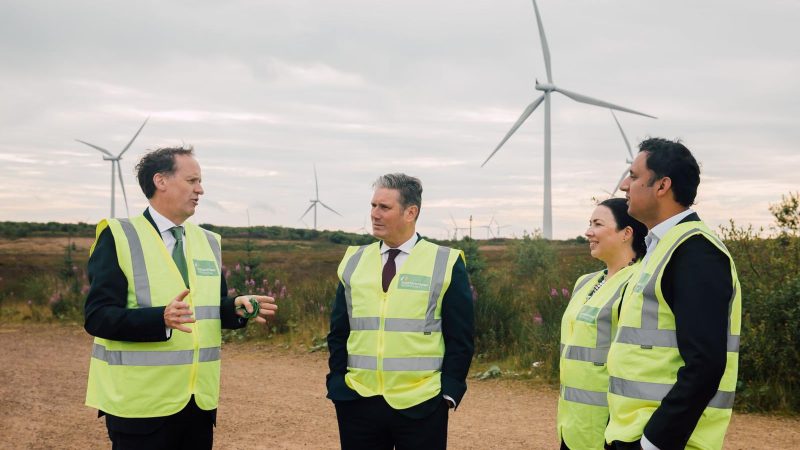
Watching Keir Starmer, Rachel Reeves, Ed Miliband and Anas Sarwar outline Labour’s vision for energy and the climate last week, I couldn’t help but feel genuinely excited about the green prosperity plan. Now, admittedly, this is partly because I’m exactly the kind of person that would get excited listening to climate policy. But more than that, it’s because despite some of the negativity and criticism that has followed the announcements, the proposals are radical, ambitious and inspiring.
Blocking Rosebank oilfield is not a practical option for Labour
The North Sea has become somewhat of a prickly issue for Starmer and Labour. The party has received criticism from the Tories, the right-wing press and major trade unions over plans to phase out oil and gas production under a Labour government. Starmer is right to stand up to this criticism and to reinforce the commitment to not hand out new licences.
But it was another commitment for which he drew more criticism, as he confirmed that Labour would not revoke existing licenses. With the very controversial Rosebank oil and gas field expected to be given the go-ahead by the Tories shortly, there have been calls for Labour to commit to overturning this.
But unfortunately, this is not a practical option. Existing licenses can only be revoked if the contractual conditions are breached, and Labour would have no basis to do so otherwise. Doing so would almost certainly end in a loss in court, only serving to unnerve energy companies about investing in renewable energy in the UK. New oil and gas licences are not compatible with our climate targets and absolutely should not be awarded. But this is not Labour’s decision, nor their fault.
Barriers to climate action need to be addressed before investing at scale
When, earlier this month, it was reported that Labour was ‘rowing back’ on the pledge to invest £28bn a year on the green prosperity plan, I initially felt deeply disappointed. But as the details came to light, and the truth behind the headlines became clear, not only was I not disappointed, if anything, I was reassured.
Leaving aside the financial and interest rate arguments, Reeves argued that it was necessary to take this approach “to make sure there is time to build the supply chains we need, skill our workforce and ensure the taxpayer gets value for money” – and she’s right. As well as the workforce capacity and supply chains, we need planning reform to make it easier for renewable energy projects to be built, as well as action to tackle the decade-long wait for grid connections. These issues are barriers to climate action – barriers that need to be cleared before we start pouring in the billions required.
That’s not to say there aren’t things that Labour can’t spend on immediately. There absolutely are and the party absolutely should – but just throwing money at the problem won’t deliver net zero. These bottleneck issues need to be resolved first, otherwise Labour simply won’t be able to deliver on its goals.
I understand, and completely share, the desire to see the £28bn a year investment delivered on. Leaving aside the climate benefits, the economic benefits from the Inflation Reduction Act in the US have shown us the enormous potential for the UK. It is crucial that we don’t miss out on this opportunity. The green prosperity plan is central to Reeves’ economic plans. She knows we can’t afford to miss out on it, and Labour is certainly not ‘rowing back’ from it.
Labour’s approach would be a radical break with the status quo
Last week’s speech also saw Starmer go on the offensive, attacking the Conservative, Thatcherite approach that has dominated British politics since the 1980s. He struck out at the market dogma that been so influential and set out the role for an active state in ensuring a fair, green transition: “They still cleave to the set of ideas that came out of the 1980s: the dismissal of industrial strategy, the contempt for active government, the complacency that says only the market decides which industries matter for working people and national security. You cannot understate this, these ideas are finished.”
Despite this, there was criticism over the role of private companies in delivering Labour’s proposals and the perceived lack of large-scale state action – largely stemming from a yearning for nationalisation. I’m not going to get into the privatisation vs nationalisation debate, but I will argue that central to Labour’s platform is the active, interventionist state that is necessary to achieve a fair and green transition.
Labour has committed to creating a publicly-owned energy company, GB Energy, to own and operate renewable energy projects and to work with the private sector to speed up renewable deployment. A national wealth fund will be set up to invest in green industries, the infrastructure required to reach net zero and to create green jobs. A ‘British jobs bonus’ will incentivise the onshoring of jobs to the UK and ensure they are spread evenly around the country. A warm homes plan will allow local authorities to retrofit 19 million homes, making homes warmer, bills cheaper and emissions lower.
It can’t be overstated how drastic this change is from the tired old market-first approach of the Conservatives. Yes, Labour will work with the private sector, but you’d be very wrong to mistake partnerships for a continuation of the status quo.
Wanting to match the scope of the Inflation Reduction Act is radical. Achieving a zero-carbon electricity system by 2030 – a goal that is “at the edge of what might be possible” – is incredibly ambitious. Wanting the UK to become a ‘clean energy superpower’ is inspiring. The green prosperity plan is all these things and more.




More from LabourList
Almost half of Labour members oppose plans to restrict jury trials, poll finds
‘How Labour can finally fix Britain’s 5G problem’
‘The University of the Air – celebrating 60 years of Harold Wilson and Jennie Lee’s vision’